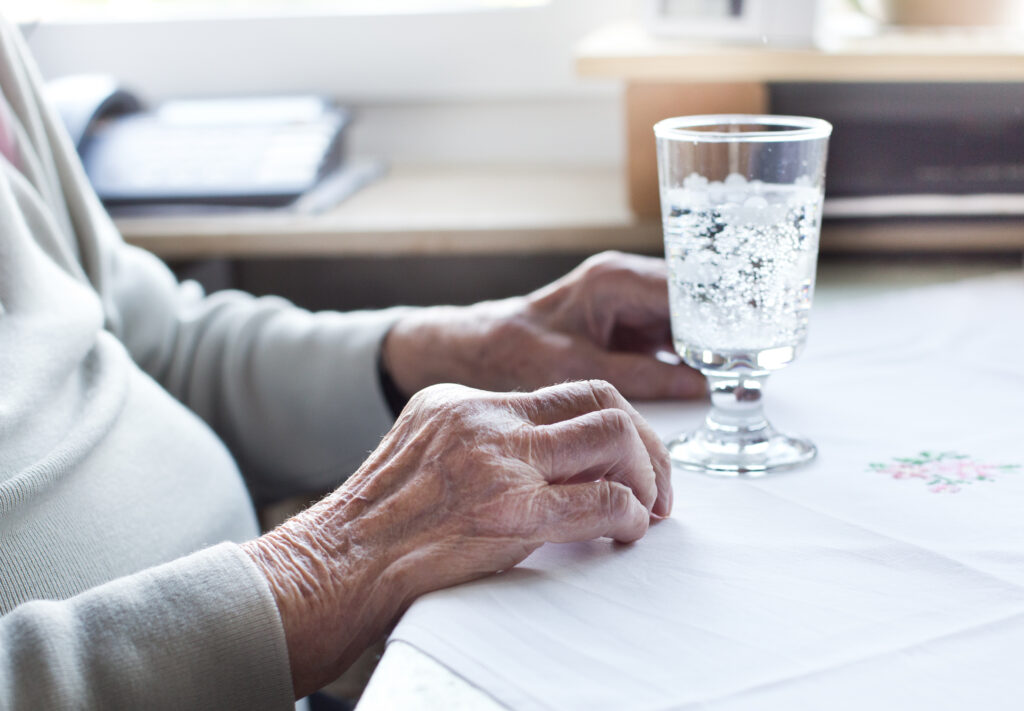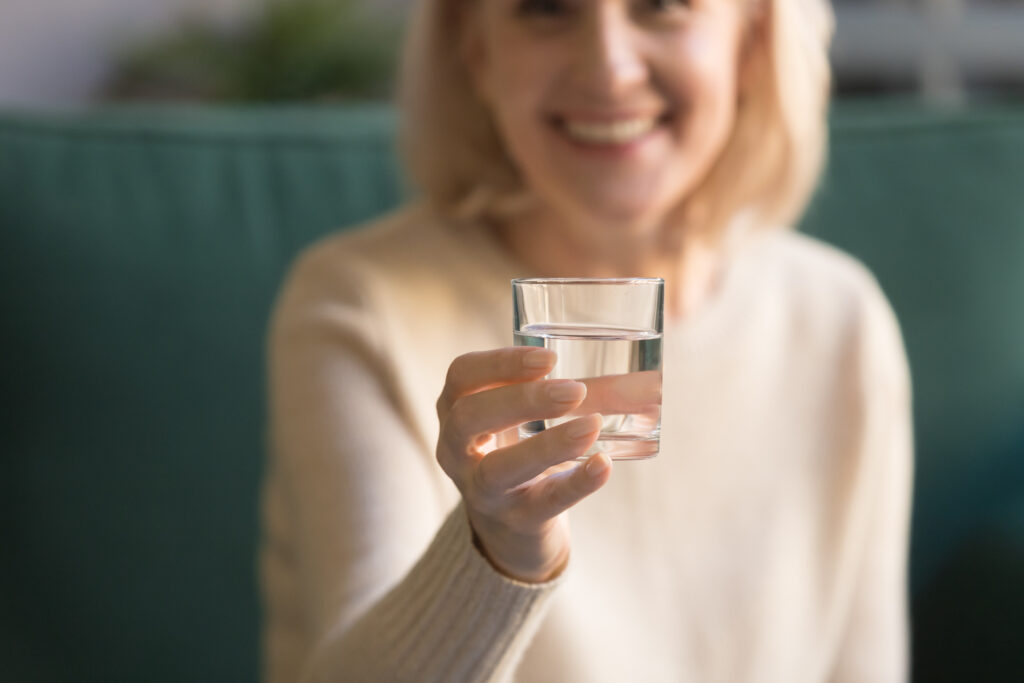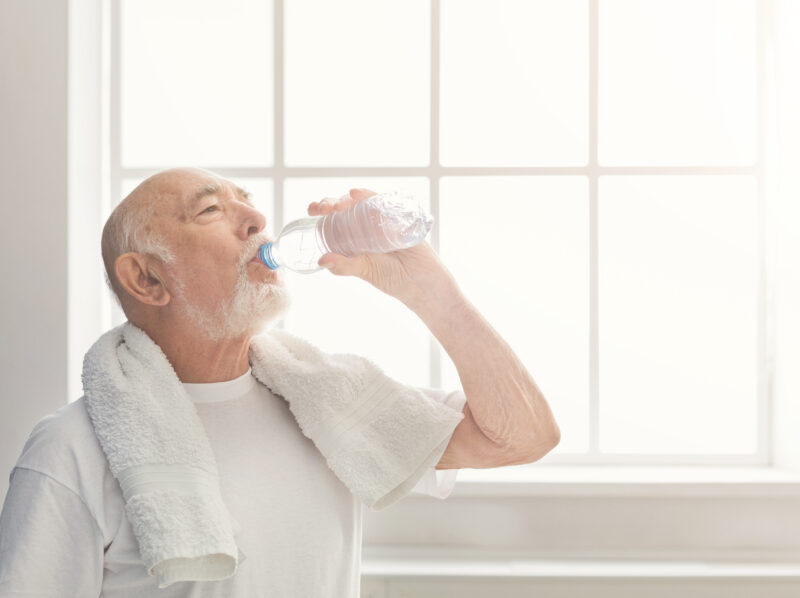Between pill reminders and doctor appointments, meal prep and bill payments, it’s often hard to remember one of the most basic daily needs: drinking water. We know our bodies are mostly water, we know we need to drink plenty of it every day, but seniors have special requirements when it comes to hydration—which makes staying on top of it as a caregiver even more important.
Americans in general don’t do well, with only 22% of us drinking the USDA-recommended amount. But this shortcoming can do much more damage to the body of an older adult, and to make matters worse, seniors are a much higher risk of dehydration than other age demographics.
One primary reason? As we age, our sensation of feeling thirsty isn’t as strong, which can cause problems, as Anne Vanderbilt, CNS, tells the Cleveland Clinic: “By the time they are thirsty, that’s already an indication of early dehydration,” she said.
Other factors are at play as well, including mobility issues that prevent many seniors from getting up to get a drink, worries about incontinence, swallowing issues (also known as dysphagia, a common side effect of many cancer treatments), or increased dehydration from certain medications.
With so many obstacles to drinking enough water – and so many harmful effects from dehydration – caregivers have an important responsibility to encourage seniors to stay hydrated throughout the day.

Spot the signs of dehydration
The signs of dehydration may be subtle – and may be confused with side effects from treatment – but be on the lookout for many common symptoms:
- A thirsty feeling that can’t be quenched
- A dry or sticky-feeling mouth
- Lack of tears
- Dark-yellow urine and/or reduced need to urinate
- Tiredness or fatigue
- Feeling of confusion
- Dizziness or lightheadedness
If dehydration is left untreated, more serious symptoms can occur, which require immediate medical attention:
- Extreme confusion
- Rapid heart rate
- Difficulty walking
- Bloody or black stool
- Disorientation
Find new ways – and foods – to increase water consumption
While the simple solution is drinking more water, that’s not always the best answer, especially in older adults, as Vanderbilt explained:
“What I often see in our advanced older adults – people in their 80s and 90s – is that they can’t sit down and drink a full 8-ounce glass of water. It fills them up, causes bloating and then makes them have to run to the bathroom. So little sips throughout the day are better.”
Instead, she said, make proper hydration an all-day activity, encouraging your loved one to drink water with every meal, as well as before and after any physical activity or exercise.
Of course, drinking plain water is not the only answer. Many healthy food options also contain plenty of water and can contribute to your senior’s overall fluid intake while mixing it up at the same time. Try some of these foods throughout the day:
- Cucumbers – At a whopping 95% water content, these garden favorites also contain plenty of anti-inflammatory compounds—plus have been linked to anti-aging and wrinkle reduction (something most older adults can certainly appreciate).
- Plain yogurt – Try to limit the sweetened varieties with their extra sugar, but plain yogurt can be up to 88% water and a great source of protein.
- Watermelon – A summer classic, this melon lives up to its name, with the flesh of the fruit at 91% water. The lycopene in watermelon may also help prevent sun damage of cells.
- Lettuce and spinach – Iceberg lettuce, while shorter on nutrients, certainly delivers a lot of hydration to your loved one’s salad at 95% water. Spinach is a close second at 91% and is a much more nutritious source of vitamins.
- Cauliflower – Surprisingly 92% water by weight, cauliflower is a versatile cruciferous with a massive load of nutrients and cancer- and cholesterol-fighting powers.
- Strawberries – At 91% water, these sweet berries also contain valuable flavonoids that have been shown to help with cognitive function, according to one study.
- Broths and soups – Most of these are water-based and also a great way to add additional vegetables to your loved one’s diet or improve nutrition for seniors who have chewing limitations.
And don’t forget simple ways to make water a little less, well, boring: Experiment with different fruit infusions like lemon, orange or lime, or add an herb such as mint or basil to change it up. Just remember to go easy on juices; while they can be a great source of water, they’re naturally high in sugar and can especially impact older adults with diabetes.

Start a healthy habit
As you care for your loved one, balancing all the responsibilities of caregiving, make sure hydration is near the top of the list. Consuming enough water throughout the day is a foundational need for good health and will positively impact both mind and body.
And, just maybe, you’ll become more aware of your own water consumption, and these new habits will rub off on you as well!

